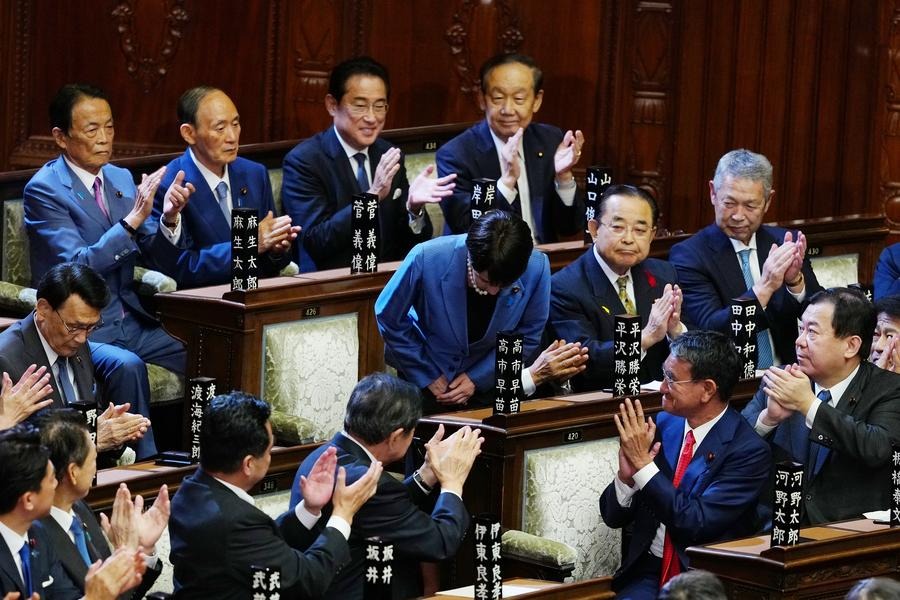China-ASEAN should join hands to safeguard South China Sea


The hegemonist and interventionist policies long pursued by the United States have led to continuous chaos and turbulence in some countries and regions, and brought about a series of grave humanitarian disasters and tragedies. The maritime field, which is regarded as the main stage for hegemony and great power competition, has also been suffering from it. To ensure the lasting stability of the order in the South China Sea, China and ASEAN must unite to oppose the US-led extraterritorial military intervention.
On Nov 9, 2021, Chinese State Councilor and Foreign Minister Wang Yi delivered remarks entitled "Enhancing Solidarity and Cooperation to Build Together a Maritime Community with a Shared Future" at the opening ceremony of the Symposium on Global Maritime Cooperation and Ocean Governance 2021, explaining China's proposals and plans in the field of maritime governance. Wang made it clear that "We oppose the maritime hegemony-seeking moves by certain countries to flex muscles, gang up to form exclusive blocs, and continuously infringe upon the legitimate and lawful rights and interests of other countries." Chinese Assistant Foreign Minister Wu Jianghao also emphasized in his speech that China "opposes maritime hegemony, division and confrontation", adding that "We ask forces outside the region to respect the regional countries’ will and efforts, instead of arbitrarily infringing upon coastal states’ sovereignty and security, stirring up trouble out of nothing, deliberately sowing discord, or disrupting peace and stability in the South China Sea." The series of statements reflect China's determination and responsibility to oppose maritime hegemony, resist extraterritorial interference, lead regional maritime governance cooperation, and safeguard peace and stability in the South China Sea.
In recent years, the international landscape has undergone profound changes. The global governance system is undergoing a long-term shift from open trade, multilateralism and cooperative security to nationalism, protectionism and strategic competition among major powers. The international power structure has undergone a new round of profound restructuring. As part of the international order, the global maritime governance system is also facing major challenges. In particular, some major powers, out of their own interests, have adopted unilateralism in maritime policies and promoted maritime hegemony, seriously impacting the current global maritime order.
In the direction of the South China Sea, the US-led countries outside military provocation against China have gradually normalized frequent close reconnaissance moves and shows of force, provoking military tensions in the South China Sea, and encouraging regional countries to confront China. It has become the biggest negative factor in the deterioration of the situation in the South China Sea and the biggest destroyer of regional maritime rules, posing a serious threat to freedom of navigation, undermining the global maritime order and making regional and global maritime governance increasingly difficult.
Achieving peace and stability in the South China Sea conforms to the interests of all countries in the region, and it is also the common aspiration and responsibility of countries in the region. China and neighboring countries in the South China Sea should cherish the hard-won stability and jointly take measures to maintain it and establish a peaceful order in the South China Sea.
First, we must jointly oppose any extraterritorial military intervention and take the initiative to ensure the security of the South China Sea. The South China Sea is the common homeland of coastal countries, and ultimately China and ASEAN countries need to guard it themselves. The fundamental initiative in the South China Sea issue always lies with China and regional countries, and the intervention of any extraterritorial country is not enough to change the regional situation. It is also not conducive to promoting maritime cooperation and the resolution of the South China Sea issue. It will only undermine the building of mutual trust among countries as well as existing regional cooperation, and also worsen the already complicated situation in the South China Sea. China-ASEAN should be alert to extraterritorial forces headed by the United States to intervene in disputes in the South China Sea and to sow discord, so as to prevent the South China Sea from becoming an arena for games between major powers.
Second, we must continue to accelerate consultations on the "Code of Conduct in the South China Sea" to jointly build rules and order in the region. The code of conduct will fundamentally help advance maritime cooperation and regional peace and stability in the South China Sea. China and ASEAN should continue to redouble their efforts to eliminate external interference, take advantage of the upcoming 30th Anniversary Summit on the Establishment of Dialogue Relations and the 20th anniversary of the signing of the China-ASEAN Declaration on the Conduct of Parties in the South China Sea next year, in an effort to make it truly a powerful weapon for resisting unilateral power by outside forces.
Third, we must vigorously advocate for the establishment of a "blue economic partnership" to enhance the foundation of mutual trust. Under the backdrop of the positive progress made on the 21st Century Maritime Silk Road, China-ASEAN can use the marine economy as a starting point to actively promote the establishment of a blue partnership of "openness, inclusiveness, concreteness and pragmatism, and mutual benefit". This will help create sustainability in the development of the "blue engine" to jointly respond to the security, environment and fishery challenges faced by the South China Sea, so that China-ASEAN relations can be freed from the constraints of the South China Sea security dilemma and develop through practical maritime cooperation.
"Mankind should not be split into isolated islands or blocs by oceans. Instead, we should make the ocean a bond for stronger solidarity and jointly build a maritime community with a shared future." As the true masters of the South China Sea region, the two parties should unite, based on the concept of a community with a shared future for the sea, eliminate external interference, work together to promote peace and stability in the South China Sea, and further develop and upgrade China-ASEAN relations, so that the South China Sea truly becomes a beautiful place where people from China and the region can live and thrive.
The author is an assistant researcher at the National Institute for South China Sea Studies, Haikou, China.
The opinions expressed here are those of the writer and do not necessarily represent the views of China Daily and China Daily website.
If you have a specific expertise, or would like to share your thought about our stories, then send us your writings at opinion@chinadaily.com.cn, and comment@chinadaily.com.cn.


































